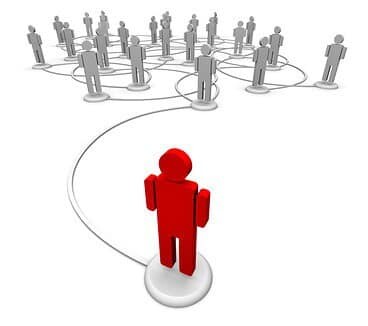Networking with other people makes us feel “dirty”
 In spite of the billions of users of social networking sites almost all of those account holders are bystanders. Most people on social networks are “lurkers” – people who lurk in the shadows and watch what other people are doing but without taking part in it themselves. The bulk of social networking is actually done by a relatively small number of people.
In spite of the billions of users of social networking sites almost all of those account holders are bystanders. Most people on social networks are “lurkers” – people who lurk in the shadows and watch what other people are doing but without taking part in it themselves. The bulk of social networking is actually done by a relatively small number of people.
Given the vast amount of articles, blog posts and videos online all demonstrating the significant benefits of networking you would expect the number of people taking an active part to be much higher than it actually is. Almost all Tweeting, for instance, is done by just 5% of the people on Twitter.
So why do people sign up, but then give up?
The answer could be found by considering what you might call “real world” networking. You know the kind of thing, business events where you turn up to meet like-minded people and get to know potential clients, suppliers or introducers. Most businesses do not go to such events. Furthermore most of the people there are also “lurkers”; they turn up, grab a coffee and a sandwich, be polite to people and leave having listened to a speaker or watched a demonstration of something. Most people who go to real world business networking events don’t actually “network” either.
Whether you look at online social networks or real world social networks the same behaviour is being repeated. People tend to lurk and not take an active part.
There is only a relatively small amount of psychological research on networking, but a recent study shows why this lack of networking is happening. It turns out that networking with other people makes us “feel dirty”. For some reason we don’t yet understand, social networking in the real world is perceived somewhat negatively by many people because it makes them feel impure in some way. That might also explain the extent of lurking in online social networks.
The research also showed that the people who don’t have feelings of being dirty are the ones in most power, usually the ones who don’t need to network in the first place.
But an intriguing part of this study was in finding what made people feel OK about networking.
It transpired that the people who do not have these physical or moral objections to networking were the ones who went to business events and gave something. In other words, you do not feel dirty and take a more active part in social networking when you give, rather than when you take. It is the going to networking events and seeing them as something which you take from that triggers the feelings of physical dirtiness, it seems.
So what does that mean for online social networking?
It suggests that the more you share, the more you provide information, the more you give other people, the better it will be for you. Social networking is not about taking, It is about giving.



